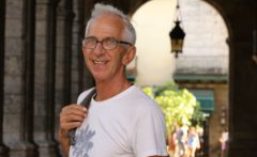Walking along the narrow cobbled streets of Old Havana in March this year, the day was hot and humid and I was sweaty and in need of a shady refuge. Making my way along calle Oficios towards the Plaza de Armas, I came across a shady little park with some bench seats (in Cuban Spanish: un parquecito). Finding myself in a shady seat and looking about, I saw a tall plinth in the centre of the park, with the bust of a rather handsome young man mounted on top. The inscription read “Alexander von Humboldt, 1769 – 1859”. I knew the name – because he was a naturalist explorer after whom the Humboldt Current was named, the nutrient rich ocean current which flows up the west coast of South America from Antarctica



 ; and because his account of his travels through the Spanish colonies of the New World was Charles Darwin´s favourite bedtime reading!
; and because his account of his travels through the Spanish colonies of the New World was Charles Darwin´s favourite bedtime reading!
As I looked further, across narrow calle Oficios, on the corner with Muralla, stood a large, elegant colonial building, with a sign stating that the famous traveller had lived here during his first stay in C uba from 19 December 1800 until 15 March 1801. The house is the Humboldt Museum, however it has been closed for restoration for a few years.
uba from 19 December 1800 until 15 March 1801. The house is the Humboldt Museum, however it has been closed for restoration for a few years.
A second plaque on the building had a quote from a distinguished Cuban anthropologist and expert on Afro-Cuban culture, Fernando Ortiz, which referred to Humboldt and stated:
“He discovered in the darkness with which slavery enveloped Cuba, the lights with which to illuminate the awareness of the nation”
Wanting to know more about the homage that Cuba was paying to this young European visitor from the early 19th century, I made enquiries from Cuban friends. What I found was that Alexander von Humbolt, is well known to all Cuban school children as “the second discoverer of Cuba” (after Christopher Columbus – who is credited as being the first).
Carrying a rare passport issued to him by the King of Spain, Alexander von Humboldt (Baron Friedrich Wilhelm Heinrich Alexander von Humboldt) visited various Spanish American colonies, including Cuba, during a self-funded voyage of scientific discovery from 1799 to 1804. He made two short visits to Cuba and used his time well. The Royal Passport ensured that he was well received by the noblest of Cuban families and had access to Government records of the business of the colony – including sugar, coffee and tobacco production and export, trade with other Spanish colonies, and slavery.
Twenty two years after returning to Europe, Humboldt published a book about Cuba in Spanish, entitled “Political Essay on the Island of Cuba”. Apart from providing a detailed snapshot of the state of the colony in the early part of the 19th century, the book gave details of the climate and geography, the fauna, flora and geology, economy, the population and racial mix… and most sensationally a fierce condemnation of the treatment of slaves and their use in all plantation-based economies, including Jamaica and the southern states of the USA. The book was banned in colonial Cuba. Humboldt was furious, in 1855, when an English translation was released in the USA by Mr J. S. Thrasher, with an open call for annexation of Cuba by the USA, and without the chapter on slavery.
Before he died in his 90th year in 1859, Humboldt had become arguably the most famous and respected scientist in the world. Charles Darwin, who carried Humboldt´s publications with him on he voyage of the Beagle, described him as “the greatest scientific traveller who ever lived”; and the Prussian King Friedrich Wilhelm IV said Humboldt was “the greatest man since the deluge”. According to US poet Ralph Waldo Emerson:
“Humboldt was one of those wonders of the worlds…who appear from time to time to as if to show us the possibilities of the human mind, the force and range of the faculties – a universal man.”
Excellent publications about Alexander von Humboldt in recent times include:
ALEXANDER VON HUMBOLDT – A METABIOGRAPHY, by Nicolaas Rupke (2008); University of Chicago Press, Chicago.
TRANSATLANTIC ECHOES – ALEXANDER VON HUMBOLDT IN WORLD LITERATURE, edited by Rex Clark and Oliver Lubrich (2012); Berghahn Books, New York and Oxford
THE INVENTION OF NATURE by Andrea Wulf (2015); John Murray Publishers, London.
A LONGING FOR WIDE AND UNKNOWN THINGS: THE LIFE OF ALEXANDER VON HUMBOLDT by Maren Reinhardt (2018); C. Hurst and Co., London.
